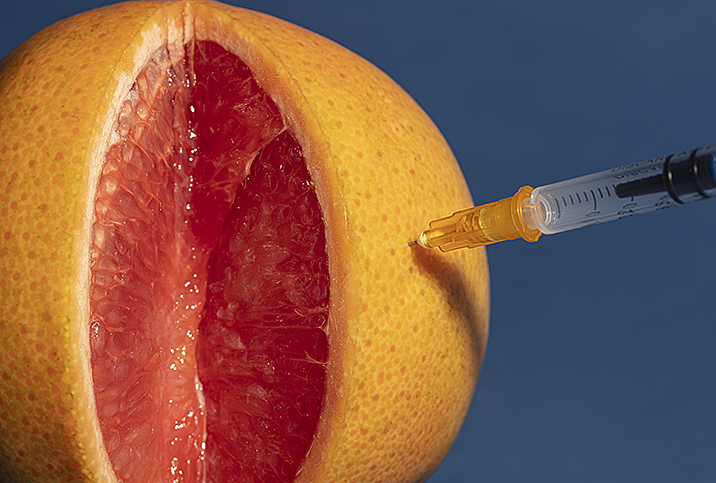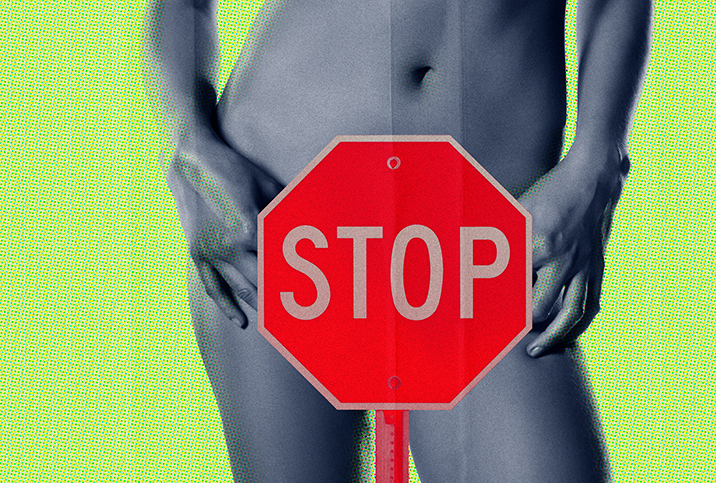Does a Splash Pregnancy Have a Decent Rate of Success?

We all know how babies are made (hopefully), but what happens when penetrative vaginal sex is near, if not totally, impossible due to pain?
This is the case for some people with vaginismus, which affects 5 percent to 17 percent of people with vaginas. Vaginismus is a condition in which the vagina involuntarily clenches upon penetration and causes feelings of dull or sharp pain and pressure.
The condition can be debilitating, and it's especially upsetting when you're trying to have a baby.
Several Reddit users know this. On the subreddit r/vaginismus, users explored the idea of a "splash pregnancy," otherwise known as a pregnancy achieved by a partner ejaculating close to (not inside of) their partner's vagina. For user u/themarriedvirgin, it worked—by accident. But is it a method that can work consistently for people?
Is there a chance you can get pregnant with a splash pregnancy?
Before you get your hopes up, it's important to note pregnancy via this method isn't exactly likely. A splash pregnancy has a lower chance of success than sexual intercourse, but it might not be impossible.
"Splash pregnancy, or nonpenetrative pregnancy, is a rare occurrence," said Heather Bartos, M.D., an OB-GYN in Texas. "It is possible to get pregnant if sperm comes into contact with the vagina, although the risk of getting pregnant in this way is very low because sperm can only live for a short time outside the body."
She explained that once sperm dry out, they can't move anymore and, therefore, can't do their job. But sperm coming in contact with oxygen isn't a problem, she added.
Another expert, Philadelphia-based sex educator Erica Smith, M.Ed., agreed with the pregnancy possibilities: "People can absolutely become pregnant when semen is on [or] very near the vaginal opening, without a partner ejaculating inside the vagina."
Smith shared a 2018 study in Dovepress that indicated 65 percent of patients studied were able to conceive without penetration. A 2012 study in Malaysian Family Physician backed up the possibility of it working, too, with a case study in which a 32-year-old woman was successful multiple times.
How can you increase your chances of a successful splash pregnancy?
Sticking with the usual best practices for getting pregnant can help your luck. Bartos listed timing sex near ovulation, lying down on your back afterward and using fertility-friendly lubricants. To find the latter, look for products that have a low pH and are cleared by the Food and Drug Administration.
"If ejaculation can occur slightly inside of the vagina, that's even better," she added.
If fingers aren't too much of a problem for you, consider using them to ensure the semen gets inside.
"Rather than just have someone ejaculate on the vaginal opening, use your or a partner's fingers to place some [semen] inside of the vagina," Smith explained.
What can you do if a splash pregnancy doesn't work?
If your pregnancy test still shows one line, try not to worry too much—you have other options.
"If splash pregnancy is not successful, then next steps can include intrauterine insemination or at-home insemination using the 'turkey baster,' which isn't actually that," Bartos said. It's more like a syringe.
Smith mentioned IUI and in vitro fertilization (IVF), too, warning they're expensive and invasive, so maybe try the splash method more than once. People usually start with IUI, which is less expensive and less invasive.
Pelvic floor physical therapy is another consideration, according to Bartos. It can ease the discomforts that come with penetration, pregnancy and labor pains. Reddit user u/myvagthrowaway suggested it in r/vaginismus, saying dilators and a pelvic floor physiotherapist were a helpful part of the process.
While splash pregnancy isn't always the answer, it is a valid option to consider if you want to get pregnant without penetration.


















